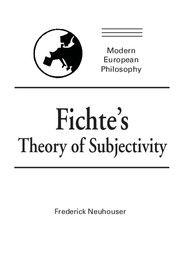Book contents
- Frontmatter
- Contents
- Acknowledgments
- Abbreviations
- Introduction
- 1 Origins of Fichte's theory: the notion of the unity of reason
- 2 The development of Fichte's project from 1793 to 1799
- 3 The self-positing subject and theoretical self-consciousness
- 4 The self-positing subject and practical self-determination
- Conclusion
- Bibliography
- Index
4 - The self-positing subject and practical self-determination
Published online by Cambridge University Press: 05 June 2012
- Frontmatter
- Contents
- Acknowledgments
- Abbreviations
- Introduction
- 1 Origins of Fichte's theory: the notion of the unity of reason
- 2 The development of Fichte's project from 1793 to 1799
- 3 The self-positing subject and theoretical self-consciousness
- 4 The self-positing subject and practical self-determination
- Conclusion
- Bibliography
- Index
Summary
In Chapter 2 we saw that Fichte's theory of subjectivity is best understood as one version of the project of demonstrating the unity of theoretical and practical reason. As such, the theory attempts to specify the essential feature of subjectivity in general by isolating a single, fundamental structure of consciousness that can account for the possibility of subjectivity in both its theoretical and practical forms. Furthermore, we saw that Fichte understands this structure as a particular kind of activity, which he terms “self positing.” The aim of Chapter 3 was to analyze Fichte's attempt to account for theoretical self-consciousness in terms of a subject's self-positing activity, and the task that faces us in the present chapter is to understand how Fichte intends to use the same notion as a principle of practical philosophy. In general terms, what Fichte must show is that practical subjectivity depends in an essential way upon self-positing activity, or upon the subject's entering into a kind of reflexive, nonobjective relation to itself, through which the subject also constitutes itself.
One important part of this project will be to specify the particular aspect of practical subjectivity that Fichte intends to give an account of. In doing so, it should first be pointed out that there are actually a number of ways in which Fichte attempted to draw an essential connection between theoretical and practical subjectivity. One of the most widely known of these is expressed in remarks throughout the two 1797 introductions to the Wissenschqftslehre that refer to both pure apperception and the consciousness of the categorical imperative as kinds of intellectual intuition.
- Type
- Chapter
- Information
- Fichte's Theory of Subjectivity , pp. 117 - 166Publisher: Cambridge University PressPrint publication year: 1990

